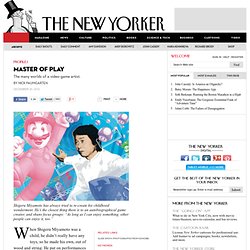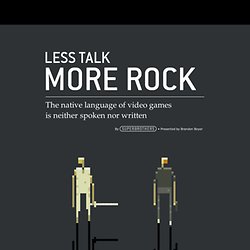

Gaming can make a better world. Shigeru Miyamoto, Nintendo’s man behind Mario. When Shigeru Miyamoto was a child, he didn’t really have any toys, so he made his own, out of wood and string.

He put on performances with homemade puppets and made cartoon flip-books. He pretended that there were magical realms hidden behind the sliding shoji screens in his family’s little house. There was no television. His parents were of modest means but hardly poor. This was in the late nineteen-fifties and early nineteen-sixties, in the rural village of Sonobe, about thirty miles northwest of Kyoto, in a river valley surrounded by wooded mountains. Miyamoto has told variations on the cave story a few times over the years, in order to emphasize the extent to which he was surrounded by nature, as a child, and also to claim his youthful explorations as a source of his aptitude and enthusiasm for inventing and designing video games.
Fishermen have a saying, in reference to the addictive sensation of a fish hitting your line: “The tug is the drug.” Ol’ Mark Pincus Had a Farm… Correction appended This year, Mark Pincus, the founder and C.E.O. of Zynga—the company that created the silly Facebook games FarmVille, CityVille, and Zynga Poker, the most popular online poker game in the world—had plans to spend the whole month of March at his ranch outside of Aspen.

Pincus, who is himself, along with his company, devoted to the concept of “play” in theory, practice, and also as an extraordinarily lucrative business model, was determined to have fun. “Aspen is just dialed in as a sports town,” he says. “You have skiing, hiking, road-biking, mountain-biking, golf, tennis … ” A slight five feet six, with large liquid brown eyes, Pincus looks down for a moment and purses his lips. “I have to say, though, I hate tennis here. So, on this Wednesday in the middle of his Aspen week, Pincus has been having fun all morning, slicing down Aspen Mountain before barreling down his driveway for a late lunch. Pincus’s games work off a few basic principles.
Less Talk More Rock. By • Presented by Brandon Boyer Not too long ago, Jordan Mechner and Eric Chahi were chatting with Eric Viennot, a French creator and writer.

Jordan Mechner single-handedly pioneered a type of cinematic videogame with Karateka in 1984 and Prince of Persia in 1989. Eric Chahi similarly single-handedly created 1991's Another World -- known in the U.S. as Out of this World -- a painterly cinematic videogame in a similar tradition. Jordan Mechner had the following advice to share, I think it's great advice. A project starts with an idea, a vision, something that is hard to define, something kind of magic and amazing.
Usually in the creative process, the next step -- step 2 -- is to think about the project intellectually, to talk about it, to look at it from various angles, to plan it out, maybe to second guess it or to problem solve it, maybe reconsider it a bit. The next step, step 3, is to actually make this thing, to get down to it. And maybe that's where it ends. Here's a phrase. Seth Priebatsch on how gaming will change the world. Seth Priebatsch unleashed 180 seconds of organised chaos on SXSW Interactive on Saturday, turning the 4,000-strong audience into a giant trading pit.

The charismatic, high-speed founder of business location tool SCVNGR wanted to show how game dynamics – in this case based on the classic card game Pit – can help solve real problems, giving everyone in the audience a coloured card to trade as a metaphor for organising action around climate change. It's all part of his vision for the next generation of the web, one he describes as "the game layer". The card-trading game was, he admitted, a bit of a gamble – he even had an alternative "consolation on your failure" slide lined up just in case. He was only about 60% sure it would work on this scale, but the room was buzzing with energy. "Climate change is a complex problem with no central lever, and with unequal distribution of resources.
"We are going to give them some nightmares, for sure. Both Groupon and Foursquare are rivals.